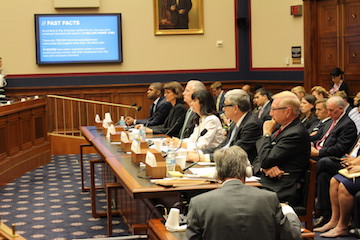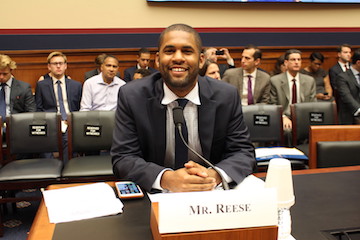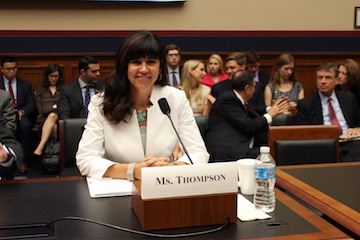By: Joey Williams, Intern, Government Relations and Public Affairs

Witnesses await the start of the hearing
This morning, the House Committee on Education & Workforce held a hearing titled “Redefining Joint Employer Standards: Barriers to Job Creation and Entrepreneurship.” The title was fitting, as witnesses from the franchise industry testified about the extra challenges they have faced, due to the Obama-Era joint employer definition.
Chairwoman Virginia Foxx started the hearing off by stressing the importance of small businesses, saying they are “the driving force behind the American economy and the American dream.” Foxx, a former small business owner herself, understands the difficulties these businesses go through. Overregulation by the government, such as expanded joint employer, burdens them more than it does larger corporations. As Foxx put it, the NLRB “launched an unprecedented attack” with the 2015 joint employer decision, one that it must fix through legislation.

Jerry Reese, II, Director of Franchise Development at Dat Dog
Jerry Reese, II, Director of Franchise Development at Dat Dog Franchise, LLC, provided the first testimony. He highlighted how the joint employer standard not only hurts his business, but his community. Dat Dog, as he explained, is “more than its food and drink offerings.” Dat Dog is primarily driven by the desire to make people happy. This shines through in their regular charity events and fundraisers. Because they are rooted in their hometown of New Orleans, they know enough about the area to fit their work to the specific needs of the community. The franchising model, therefore, is their best step into growing nationwide. If all their stores were corporately owned, they couldn’t deliver on their mission of fitting to the community. With locally owned stores, individual owners with knowledge of the area can make decisions about what needs must be met to succeed. With joint employer’s current lack of clarity, this will not be possible. Reese explained that they simply don’t have the funds to take on the financial responsibility of their franchisees’ employees. Therefore, they will be able to achieve their mission of giving back to communities around the country only if the joint employer issue is resolved.

Mary Kennedy Thompson, COO at the Dwyer Group
Mary Kennedy Thompson, Chief Operating Officer at the Dwyer Group, testified on behalf of the IFA. To begin, she explained that her career starting in franchising. After returning from eight years as an officer in the U.S. Marine Corps, Thompson had her sight set on becoming a business owner, but didn’t know where to start. That is when she came across the franchise brand, Cookies by Design. After reaching out to them with interest in becoming a franchisee, Cookies by Design provided Thompson with essential training to become a knowledgeable business owner. Programs like this change lives and boost the American economy. Now, Thompson continues this tradition by assuring that her franchisees receive extensive training opportunities. However, she revealed during the testimony that “the confusion around joint employer has caused [them] to pull back on those programs, unsure if [they] will be labeled a joint employer.”
In her closing statement, Rep. Foxx asserted that “the founders did not intend for the courts to run this country” and stressed the need for the legislative branch to reduce uncertainty. Rep. Foxx, in conjunction with witnesses Jerry Reese and Mary Kennedy Thompson, made a compelling case on behalf of small businesses and franchisees that the Obama-Era definition of joint employer needs to be repealed.


















